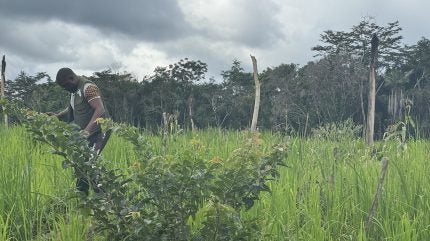
A clutch of the world’s largest chocolate makers have been linked in an NGO report to deforestation in Liberia.
Global Witness has mapped supply chains it claims has left Mars, Nestlé, Mondelez International, Hershey and Unilever “exposed” to deforestation in the west African country through the mass-balance purchasing of cocoa.

Discover B2B Marketing That Performs
Combine business intelligence and editorial excellence to reach engaged professionals across 36 leading media platforms.
According to the NGO’s research, major commodity firms including Olam and Cargill “have played a crucial role in connecting Liberian beans to these chocolatiers”.
Global Witness said it used satellite imagery, trade data and on-the-ground interviews to trace beans from deforested areas in Liberia to the chocolate manufacturers through an “opaque, untraceable” supply chain.
The report said cocoa linked to forest destruction is being mixed with certified beans through the Rainforest Alliance’s mass balance system, allowing products to carry a “sustainable” label despite containing deforestation-linked cocoa.
In a statement to Just Food, the Rainforest Alliance said: “We encourage cocoa companies to use a segregated sourcing model because the certified ingredients are kept separate from non-certified ingredients. At the same time, without mass balance, many smallholder farmers producing certified cocoa would lose access to global markets and investment in sustainable farming and forest protection.”

US Tariffs are shifting - will you react or anticipate?
Don’t let policy changes catch you off guard. Stay proactive with real-time data and expert analysis.
By GlobalDataLiberia hosts the largest remaining block of the Upper Guinean rainforest and endangered species including chimpanzees and forest elephants.
Between 2021 and 2024, the country’s main cocoa-producing “cocoa belt” counties – Bong, Nimba and Lofa – lost around 250,000 hectares of forest, according to Global Witness.
Rising global cocoa prices have driven rapid expansion of new farms, the NGO said.
Global Witness said the five manufacturers do not buy directly from Liberia but argued informal buying networks routinely mix beans from multiple sources.
The upcoming EU Deforestation Regulation (EUDR) bans mass balance and requires full traceability for commodities sold in the EU.
Yesterday, The European Parliament joined the EU’s Council in backing a further delay to the introduction of EUDR.
Responding to the Global Witness report, a Nestlé spokesperson told Just Food: “We do not operate in, nor source cocoa directly from, Liberia. Traceability is a priority for us, and we are continuously strengthening it. All cocoa beans we source directly come through the Nestlé Cocoa Plan or our Income Accelerator Program.”
A spokesperson from Mars said: “We understand that forests and other natural ecosystems are essential for a healthy environment and productive supply chains.
“Mars does not source cocoa from Liberia and our suppliers are not sourcing cocoa from Liberia for cocoa sourced under the Mars Responsibly Sourced Cocoa Program.”
Meanwhile, Cargill said it “does not directly source (or otherwise purchase) cocoa of Liberian origin from Aya Group, ECOM, or Touton.”
“We can further clarify that based on our information, we have no knowledge of prior purchases from these entities.”
Olam pointed Just Food to a statement it provided to Global Witness, which read: “[W]e will assess this carefully and as required, engage with our suppliers and investigate suitable mitigation actions.”





